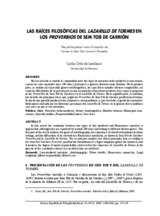Mostrar el registro sencillo del ítem
Las raíces filosóficas del Lazarillo de Tormes en los Proverbios de Sem Tob de Carrión
| dc.contributor.author | Ortiz de Landázuri, Carlos | |
| dc.date.accessioned | 2022-07-19T06:36:39Z | |
| dc.date.available | 2022-07-19T06:36:39Z | |
| dc.date.issued | 2017 | |
| dc.identifier.issn | 2530-7878 | |
| dc.identifier.issn | 1133-0902 | |
| dc.identifier.uri | http://hdl.handle.net/10396/23647 | |
| dc.description.abstract | En este artículo se aborda la continuidad entre dos tipos de narrativa tardo-medieval y renacentista, a pesar de estar separadas unos 200 años y pertenecer a géneros literarios muy distintos. En la primera parte, se analiza así el peculiar género autobiográfico, los específicos mundos urbanos compartidos, así como las dificultades de su pervivencia en una monarquía renacentista moderna, tal y como se proponen en los Proverbios de Sem Tob de Carrión y en el Lazarillo de Tormes. En la segunda parte, se analizan, por un lado, los principios éticos que, según los Proverbios de Sem Tob de Carrión, justificaron la formulación de una querella jurídica frente al monarca correspondiente; y, por otro lado, el grado de responsabilidad moral contraída por los diferentes personajes del Lazarillo de Tormes en la génesis del escandaloso caso ético en que se ven envueltos. | es_ES |
| dc.description.abstract | In this article the continuity between two types of late medieval and Renaissance narrative is approached, although they are separated by around 200 years and belong to different literary genres. The first part of the article analyses the genre of autobiography, the experience of shared environment in urban settings, and the difficulties of its survival in a Renaissance monarchy, as shown in Sem Tob de Carrión's Proverbs and in Lazarillo de Tormes. The second part analyses the ethical principles that, according to the Sem Tob Carrión's Proverbs, justified the formulation of a legal complaint against the monarch; and it analyses the degree of moral responsibility contracted by the characters of Lazarillo de Tormes in the genesis of the scandalous ethical case in which they are involved. | es_ES |
| dc.format.mimetype | application/pdf | es_ES |
| dc.language.iso | spa | es_ES |
| dc.publisher | UCOPress | es_ES |
| dc.rights | https://creativecommons.org/licenses/by-nc-nd/4.0/ | es_ES |
| dc.source | Revista Española de Filosofía Medieval 24, 171-214 (2017) | es_ES |
| dc.subject | Narrativa tardo-medieval | es_ES |
| dc.subject | Género autobiográfico | es_ES |
| dc.subject | Mundos urbanos | es_ES |
| dc.subject | Monarquía renacentista | es_ES |
| dc.subject | Querella jurídica | es_ES |
| dc.subject | Responsabilidad moral | es_ES |
| dc.subject | Caso ético | es_ES |
| dc.subject | Late-medieval narrative | es_ES |
| dc.subject | Autobiography | es_ES |
| dc.subject | Urban worlds | es_ES |
| dc.subject | Renaissance monarchy | es_ES |
| dc.subject | Legal complaint | es_ES |
| dc.subject | Moral responsibility | es_ES |
| dc.subject | Ethical case | es_ES |
| dc.title | Las raíces filosóficas del Lazarillo de Tormes en los Proverbios de Sem Tob de Carrión | es_ES |
| dc.title.alternative | The Philosophical Roots of Lazarillo de Tormes in Sem Tob Carrión's Proverbs | es_ES |
| dc.type | info:eu-repo/semantics/article | es_ES |
| dc.relation.publisherversion | https://www.uco.es/ucopress/ojs/index.php/refime/index | es_ES |
| dc.rights.accessRights | info:eu-repo/semantics/openAccess | es_ES |

